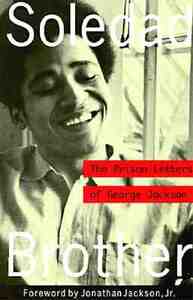Take a photo of a barcode or cover
"Cold and calm though."
In this phenomenonal work of personal letters fron revolutionary communist and political prisoner George Jackson, we get an in-depth look at his development into a revolutionary over a span of 6 years [he died in 1971 -- this book ends in 1970; in between I assume he was writing Blood in My Eye], in the worst of conditions -- in maximum security prison, largely in solitary confinement. His rage is felt on every page, even in the more intimate letters to the various women he loved, and the more kind letters to his family.
It's easy to say that George Jackson was a bitter, angry man who took his rage out on his family. However, the first 200 or so pages are letters mainly to his parents, and to his brother Jonathan Jackson, who later died in a shootout with police after taking hostages in exchange for George's freedom. He at times would lash out, but it was out of frustration that was from love for his family, and how he wanted them to understand his revolutionary views and follow suit. One of the most memorable [and one of my favorite] passages in this entire book is in the last pages, when George writes that his father, who in the first half of the book tries to beg George to assimilate to colonialist, white-supremacist society, refers to cops as "pigs", and George says "he'll be alright." Additionally, he admits in his final letter, while lamenting on Jonathan Jackson's death, that he completely misunderstood his mother and her loyalty to him. Another sad, but touching moment.
The misogyny in the first part of the book is something we can't ignore. Many revolutionary men of that time were misogynistic [and many still are now, but with way more criticism, as there should be]; men and women could be revolutionary, but women were still seen as subservient. In his earlier writings, George Jackson absolutely co-opts this view. It's uncomfortable to read, but I remind myself that when he was writing these early letters, he was 24, 25 years old, had been incarcerated for a third of his life, and was a nationally-oppressed Black person who had very limited access to the outside world the changing social movements. Towards the end of this book, his views have clearly changed as he writes to Angela Davis, and I have no doubt that he wouldve only progressed forward in the correct line had he not been murdered. It speaks to how revolutionaries must progress in study and practice; Fidel Castro was absolutely homophobic in his early revolutionary years -- imagine if no one ever gave him the opportunity to rectify his errors [and he definitely did].
This book is a must-read for any true communists and for anyone researching the Black liberation struggle.
George Jackson lives!
In this phenomenonal work of personal letters fron revolutionary communist and political prisoner George Jackson, we get an in-depth look at his development into a revolutionary over a span of 6 years [he died in 1971 -- this book ends in 1970; in between I assume he was writing Blood in My Eye], in the worst of conditions -- in maximum security prison, largely in solitary confinement. His rage is felt on every page, even in the more intimate letters to the various women he loved, and the more kind letters to his family.
It's easy to say that George Jackson was a bitter, angry man who took his rage out on his family. However, the first 200 or so pages are letters mainly to his parents, and to his brother Jonathan Jackson, who later died in a shootout with police after taking hostages in exchange for George's freedom. He at times would lash out, but it was out of frustration that was from love for his family, and how he wanted them to understand his revolutionary views and follow suit. One of the most memorable [and one of my favorite] passages in this entire book is in the last pages, when George writes that his father, who in the first half of the book tries to beg George to assimilate to colonialist, white-supremacist society, refers to cops as "pigs", and George says "he'll be alright." Additionally, he admits in his final letter, while lamenting on Jonathan Jackson's death, that he completely misunderstood his mother and her loyalty to him. Another sad, but touching moment.
The misogyny in the first part of the book is something we can't ignore. Many revolutionary men of that time were misogynistic [and many still are now, but with way more criticism, as there should be]; men and women could be revolutionary, but women were still seen as subservient. In his earlier writings, George Jackson absolutely co-opts this view. It's uncomfortable to read, but I remind myself that when he was writing these early letters, he was 24, 25 years old, had been incarcerated for a third of his life, and was a nationally-oppressed Black person who had very limited access to the outside world the changing social movements. Towards the end of this book, his views have clearly changed as he writes to Angela Davis, and I have no doubt that he wouldve only progressed forward in the correct line had he not been murdered. It speaks to how revolutionaries must progress in study and practice; Fidel Castro was absolutely homophobic in his early revolutionary years -- imagine if no one ever gave him the opportunity to rectify his errors [and he definitely did].
This book is a must-read for any true communists and for anyone researching the Black liberation struggle.
George Jackson lives!
I mean it's his words, his emotions. It's not a tell-all of prison life. More like a look inside what happens to a mind that is trapped within walls but unwilling to give up. Scary, frustrating, maddening and hopeful. A tragedy made by the world we live and participate in (and ignore because we can) on a daily basis.
challenging
emotional
reflective
tense
medium-paced
it was really moving to read george’s letters to his family & comrades during his years of incarceration. at times the misogyny was tough to read, and emblematic of why so many women struggled/were pushed out of the movement, and the letters also provide helpful context behind some of these dynamics/politics
dark
informative
reflective
sad
slow-paced
I've had in on my to-read forever. What better time to finally dive in than when assigned a report based on Jackson's experiences in the California prisons.
Jackson's eloquence, insight, and passion are apparent on every page. Every thoughtful penned word speaks volumes for what he experienced, what he saw, and what he was trying to communicate. And, that says a lot, when you know there must be worlds of words unsaid. And worlds of understanding lost between the lines.
Jackson's eloquence, insight, and passion are apparent on every page. Every thoughtful penned word speaks volumes for what he experienced, what he saw, and what he was trying to communicate. And, that says a lot, when you know there must be worlds of words unsaid. And worlds of understanding lost between the lines.
Very unique book. Loved seeing the transformation of George’s writing skills as the years went on. Fascinating story surrounding the circumstances of the letters. Biggest takeaway was that black Americans are kept down through economic means. This ties nicely with Zimm’s “People’s History” to demonstrate how the rich continue to keep the poor down.
There's some good stuff in here, but there's a lot of misogyny and some homophobia to wade through to get to it. There might be a reason to read this, particularly its historical significance, but there are a lot of other radical and revolutionary books you could read first.
challenging
dark
emotional
reflective
medium-paced
Graphic: Racial slurs, Racism, Sexism, Violence, Murder
Moderate: Misogyny
Minor: Adult/minor relationship, Slavery, Grief, War
dark
emotional
reflective
sad
tense
fast-paced
challenging
emotional
reflective
medium-paced






